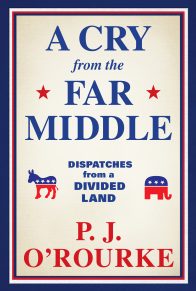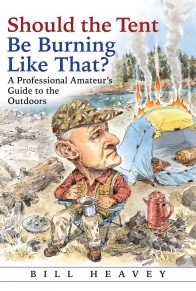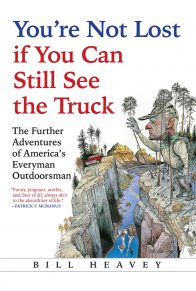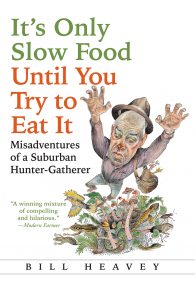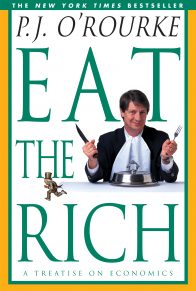Maybe taking my new laser rangefinder to my nephew’s wedding wasn’t the best idea I ever had, but bow season was coming up fast. As all bowhunters know, those long summer hours on the practice range mean zip when the moment comes and the deer you sighted at 32 yards turns out to have been standing just 17 yards from your tree. Frankly, judging distances is an area in which Stevie Wonder and I are about equally skilled. Oh, I know the basic “tricks of the trade”: If you look through your peep and see individual hairs, the deer is quite close. If you can see the whole deer and a fair amount of the real estate surrounding it, the deer is not close.
Other than that, I’m lost. I figured I needed advanced help, the kind that only $350 buys you. By the time I ordered the laser rangefinder, I had convinced myself that it was as necessary to my continued survival as oxygen, water, or Fletch-Tite.
It did not disappoint.
Arriving the morning we were due to fly to Indianapolis for the wedding, the Bushnell Yardage Pro Compact 600 lay seductively wrapped in tissue paper and a black neoprene carrying case. I picked it up and started fiddling. It had simultaneous multiple target acquisition capability like an AWACS plane; reflective, rain, and zip-thru laser modes for all-weather capability; an LCD gauge showing distances up to 600 yards with plus-or-minus 1-yard accuracy; and a 4X perma-focus sighting system with a tiny box in the middle of the crosshairs that looked like something off a smart bomb. I was smitten. I stashed it in my carry-on.
The lady at the X-ray machine was suspicious. “Why you got a camera with three eyes on it?” she asked. I explained that you look through one lens, while the others send out a laser beam, which— But at the words “laser beam,” she cut me off as if I’d said “pipe bomb.” She immediately waved over a large gentleman wearing an even larger security blazer. “Tony,” she called loudly, pointing at me.
Tony ran his wand over me to see if I’d managed to arm myself in the 15 seconds since passing through the metal detector. Then he wiped my new toy with a pad that detects explosives residue. Then he held the rangefinder up to his own eye. “See, you push that button, and it tells you how far away stuff is,” I explained nervously. I was afraid that maybe rangefinders fit into some new category of things you couldn’t bring into airports. Tony aimed it down the long corridor and hit the button. “Hey,” he said. “It’s 78 yards to the men’s room sign. Cool.” He smiled and handed it back to me.
Whoever was driving the bride to the church got lost. We sat in a stifling hot Methodist Quonset hut with zero ventilation, three crying babies, and pews built to remind the sitter that earthly existence is not meant to be fun. Numb with boredom and sweating heavily, I slipped the rangefinder out of my pocket and focused on the organist. I would have bet he was a good 30 yards off, but the LCD read 19. My arrow would have whizzed 2 feet over his head and stuck in the big pipe behind him. Someone tapped me on the shoulder. It was my wife’s sister’s mother-in-law. “Would you mind taking a picture of little Ashley and me?” she smiled.
“Happy to,” I said. I aimed and pushed the button.
“My, that camera’s quiet.”
“New model,” I explained.
The jig was finally up at the reception. I was once again overestimating distances—the buffet table that I guessed at 41 yards was a mere 27—when one of my younger cousins came up behind me. “That thing isn’t a camera,” Luke, 14, said triumphantly. I felt if anybody could appreciate my new toy, it would be a kid, so I took him into my confidence and showed him how it worked.
He began sending infrared beams all over the room. Then suddenly he burst out laughing. “Check it out, dude. Aunt Laura’s waist is 46 yards away, but her butt’s only 45 yards!”
“Gimme that thing back. And don’t you tell anybody about it, or I’ll break your fingers. Now beat it.” Last I saw him, he was 24 yards out and headed toward Aunt Laura. I made a beeline for the door.
The Access Consultant
The lady of the farm—with a chain saw, sun hat, and a look on her face like she hasn’t had a good laugh since the Johnstown Flood—makes me 20 yards out as I pull into the farm’s rutted drive. She yanks the chain saw into being and walks away. Almost as an afterthought, she sticks her free hand in the air and twirls one finger in a circle. It’s a miracle of nonverbal communication, that twirling finger. It says, Don’t even think about asking to hunt deer here. Just turn your car around and git. I do.
The next place has a gravel road lined with honey locust trees and woods on either side. Even from my car, I can see deer trails everywhere. Around back is a man sitting in the shade with a glass of beer and the sports section. I introduce myself awkwardly and ask if he has a problem with deer eating his plants. “Eat the hell outta my wife’s garden,” he says cheerfully.
I move to Stage Two, telling him that maybe we can help each other. He raises a hand just as I’m getting to the part about how responsible I am. “At least you asked. I’ll give you that. But last year, some bowhunter took out a horse we’ve had for 16 years. Broke my wife’s heart. You seem like a nice enough feller, but I can’t let you hunt here.”
At the last try of the day, I trudge unhopefully to knock on the door of what looks like an empty house. Only it isn’t empty. In fact, there’s a woman standing stone still in the dimness of the screen porch. “Ma’am?” I say. “My name’s Bill Hea—”
“I don’t care if your name’s Pat Sajak. Nobody hunts here.”
I smile. I pivot. I leave.
Two weeks later, I’m at it again. Only this time I have a secret weapon—my father. My dad is 80. He doesn’t hunt, doesn’t fish, doesn’t even approve of people who do. But he’s as extroverted as they come.
When I pick him up, he’s wearing a coat and tie and pants. When I mention that he might be a tad overdressed to talk to farmers, he says, “Always look your best for a sales call.”
“This is a sales call?” I ask.
He stops and looks at me funny. “What the heck d’you think it is?”
No one is home at the first place. No one seems to be at home at the second. The two of us stand on the front porch after knocking and listen for signs of life. “I’ll check around back,” he says. Two minutes later, I hear laughter coming from the other side of the house. On the flagstones out behind the back door, I see my father holding a glass of iced tea and talking to a couple about my age, who are so entranced they barely notice me. My father is already well into the story about how he accidentally burned down the refectory of the Church of the Redeemer on North Charles Street in Baltimore at a high school dance in the late 1930s.
The couple laugh and for the first time turn to have a look at me. “Oh, that’s my son,” my dad says offhandedly. “He’d like to bowhunt here if it’s okay with you. He’s a good boy.” The two say sure, refill my father’s glass, ask if he’d like a chair. And then he tells them the one about how the Rita Hayworth movie on the destroyer got mistaken for a German air attack.
“We’d just pulled into the harbor at Mers-el-Kebir in Algeria after a lot of combat in the North Atlantic,” he says. “A supply ship had pulled up alongside and sent over Rita Hayworth in the movie Blood and Sand. The harbor had been recently attacked and was completely blacked out, but the men were dying to see Rita Hayworth, so we rigged an overhead tarp up on deck and showed the movie under cover. Things were going fine until some knucklehead tossed a lit cigarette into the aluminum box where the film was stored. That thing went up like a torch, flames 20 feet in the air. And everybody in the harbor, thinking we were under attack, opened up with everything they had. After half an hour of fireworks, the harbormaster, thinking my ship had been hit, came over to assess the damage. I made the mistake of telling him exactly what happened, and he said, ‘Mister, we just shot off five million bucks’ worth of munitions so your men could watch Rita Hayworth. You get out of here, and don’t come back.’”
As we’re driving home, my father smiling at the thought of the new friends he’s made, I’m thinking I could rent my father out to bowhunters as an “access consultant.” I’d charge $300 an hour. I know guys who’d pay in a heartbeat.




